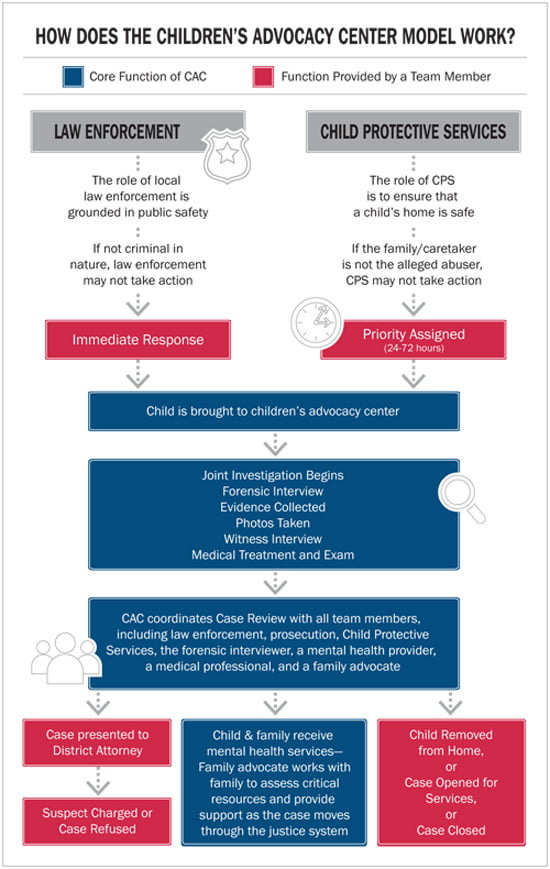How it Helps Sexually Abused Kids
A Children’s Advocacy Center, or CAC, is an organization that focuses on helping victimized children sensitively yet efficiently. They do so without forcing children to relive their horrible experience by repeating their stories numerous times. CACs bring together specialists from many different disciplines: law enforcement officials, child protective services, lawyers, psychiatrists, physicians, and child advocacy groups. These individuals jointly interview abused children and decide, as a single unit, the best course to take with the investigation of the crime, the treatment of the children’s psychological trauma, and the proper conduct of legal proceedings.
The Model, Explained
Customarily, there is little to no cooperation between law enforcement, advocacy groups, and the medical community. Traditionally, each of these groups would interview abused children separately. This process can be traumatic for children. They are forced to repeat their stories over and over again, reliving and re-experiencing the trauma and abuse they suffered.
Consequently, the Children’s Advocacy Center model was created on the belief that forcing a child to sit through multiple interviews and examinations is inhumane and undesirable. Therefore, the Children’s Advocacy Center model streamlines and combines the processes of medical examination, law enforcement investigation, and criminal prosecution.
 Let us examine a typical childhood sexual abuse case and run it through the Children’s Advocacy Center model so that we may see how effective it is at helping sexually abused minors.
Let us examine a typical childhood sexual abuse case and run it through the Children’s Advocacy Center model so that we may see how effective it is at helping sexually abused minors.
-
A sex crime is perpetrated against a minor.
The police are informed and immediately respond, as we see in the upper left-hand corner of the chart above.
-
The child is brought to the advocacy center, and the investigation begins.
If the child’s abuser was a parent or official caretaker, CPS will be involved as well. Advocacy center staff first administer a forensic interview, which is a structured conversation with a child intended to elicit detailed information about a possible event(s) that the child may have experienced or witnessed. This type of interview seeks to gain, from the child, testimony which could be useful during a criminal trial; to determine how safe or unsafe the child’s home is; to learn facts which will confirm or disprove the suspicion that the child was neglected or abused; and to determine whether the child requires psychological and/or medical treatment.
In the case of childhood sex abuse victims, the advocacy center’s interview process: collects the exact details of the abuse; determines whether or not the child should be removed from the home; and maps out a psychiatric treatment plan. The interview may run into multiple structured sessions, depending on how traumatic the child’s experience was and how easily the child is able to talk about it.
-
Physical evidence, if any, is collected, and photographs are taken.
Any other witnesses to the abuse are also interviewed.
-
The child undergoes a medical exam.
The child undergoes a medical examination, and also receives any necessary treatment.
-
The Children’s Advocacy Center reviews the case with all relevant agencies.
At this point, the CAC’s role is reduced, as the other agencies and organizations pursue their various duties. In the case of a childhood sex abuse case, the evidence will be presented to the district attorney, who will press charges against the suspect. If said suspect was a family member or a caretaker, CPS will take whatever action they deem appropriate. The CAC, in the meantime, provides mental health services to the family and the child in question. They are provided with a “family advocate” who provides them with resources and other forms of support as the legal case progresses.
Advantages, as Applied to Victims of Abuse
The two major advantages of the Children’s Advocacy Center model as it applies to victims of childhood sexual abuse are:
- The information-gathering process is centralized and streamlined, and all of the relevant agencies have equal access to evidence as it becomes available, speeding the process of investigation, prosecution, and medical and psychological healthcare; and
- The trauma and/or discomfort incurred upon the child as a result of the information-gathering process is minimized.
It’s imperative that, in the scramble to prosecute sex offenders and seek justice for the victim, the victims’ health and safety are not pushed aside. An inefficient investigation process—whereby multiple agencies interview sexually abused children repetitively—can have a negative impact on a recovering victim’s psychological wellbeing. The Children’s Advocacy Center model ensures that the investigation and treatment process proceeds quickly while safeguarding the child’s emotional and mental security and stability.
Get Childhood Sex Abuse Help Now
If your child is a victim of sexual abuse, don’t remain silent. Victims of childhood sex abuse often have to deal with a lifetime of physical and psychological problems as a result. Nobody but the offender and the institution that enabled their behavior should be responsible for physical and mental healthcare costs. Call the law firm of Cerri, Boskovich & Allard. We have proven experience in litigating childhood sexual abuse cases. We have the financial resources required to fight for you, and you don’t pay a penny unless we win. Give us a call today at 408-289-1417.
 Latest News
Latest News














